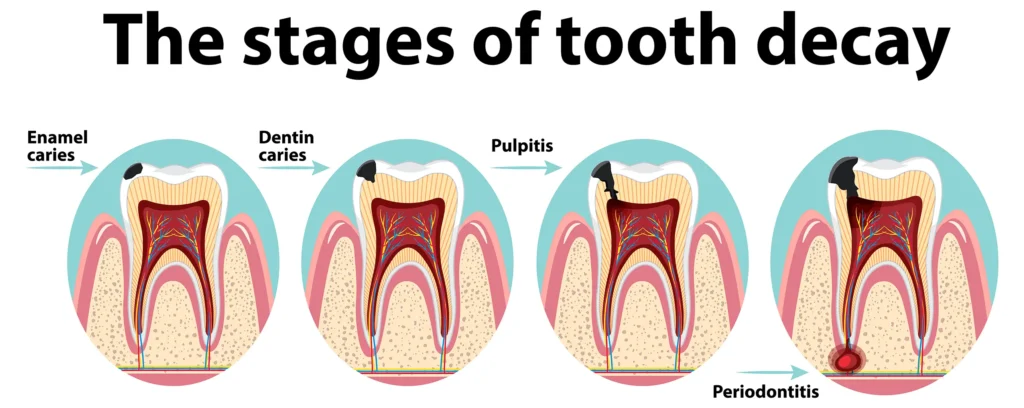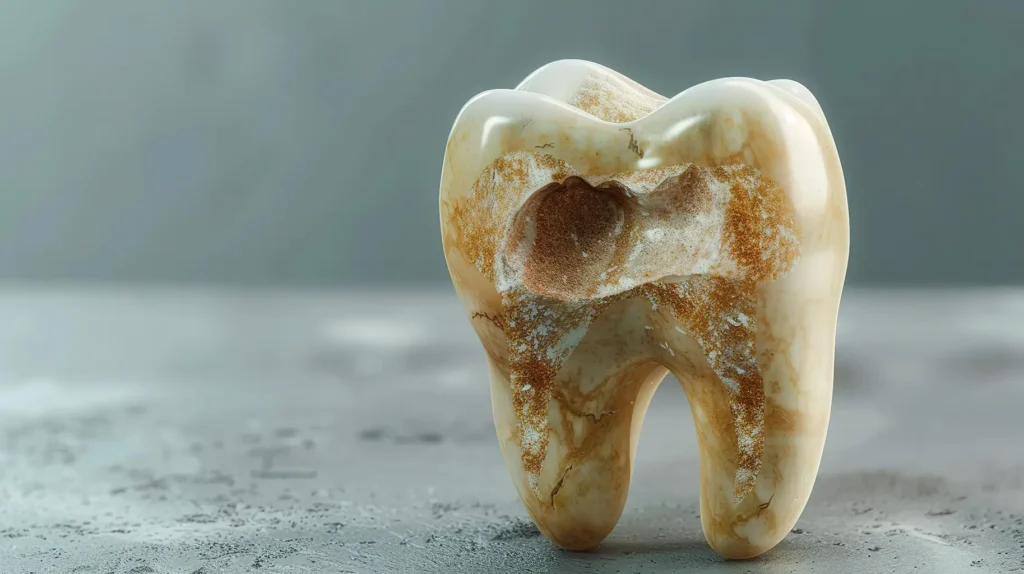Cavities, also known as dental caries or tooth decay, are one of the most common oral health problems affecting people of all ages. Despite their prevalence, many people are unsure about what cavities look like, how to recognize them, and what steps to take if they develop one. This comprehensive guide from
Big Sky Family Dental will provide you with essential information about cavities, their appearance, symptoms, causes, and treatment options. Take proactive steps to maintain your oral health and prevent future dental issues.

What Do Cavities Look Like?
Cavities can vary in appearance depending on their location and severity. Here are some common visual characteristics to help you identify them:
1. Early-Stage Cavities
In the initial stages, cavities may not be easily visible. They often start as small white spots on the tooth’s surface, indicating demineralization. These white spots are early signs of enamel erosion caused by acid-producing bacteria. At this stage, there may not be any discomfort or noticeable symptoms.
2. Brown or Black Spots
As the cavity progresses, it can turn into a brown or black spot on the tooth. These spots may be visible on the biting surfaces of molars or in the crevices between teeth. The discoloration occurs as the enamel continues to break down, allowing bacteria and debris to accumulate in the cavity.
3. Holes or Pits
In more advanced stages, visible holes or pits are created in the tooth. These holes can vary in size and depth, and they may be easily seen or felt with the tongue. Cavities that have reached this stage typically require dental treatment to prevent further damage and restore the tooth’s structure.
4. Visible Decay
In severe cases, cavities can cause significant decay that affects the tooth’s appearance. The affected tooth may appear damaged, with visible signs of erosion, crumbling, or even broken pieces. At this point, the cavity has likely penetrated through the enamel and dentin layers, potentially reaching the pulp.
Are Cavities Painful?
Are cavities painful? The answer depends on the stage and location of the cavity. Here are some insights into how cavities can affect your comfort:
1. Early Stages
In the early stages of cavity formation, you may not experience any pain or discomfort. The damage to the enamel is minimal, and the cavity may go unnoticed without a dental examination.
2. Sensitivity
As the cavity progresses and reaches the dentin layer beneath the enamel, you may start to experience tooth sensitivity. This sensitivity can occur when consuming hot, cold, sweet, or acidic foods and beverages. The dentin contains tiny tubules that connect to the tooth’s nerves, making it more sensitive to temperature changes and certain substances.
3. Mild to Moderate Pain
When the cavity reaches a more advanced stage, you may experience mild to moderate pain, especially when biting down or chewing. The pain can be intermittent or persistent, depending on the severity of the decay and the extent of nerve involvement.
4. Severe Pain
In severe cases, cavities can cause intense, throbbing pain that may radiate to other areas of the mouth or face. This level of pain typically indicates that the decay has reached the pulp, the innermost part of the tooth containing nerves and blood vessels. If left untreated, this can lead to an abscess, a painful infection that requires immediate dental care.

What Should I Do If I Get a Cavity?
If you suspect that you have a cavity, it’s essential to take prompt action to prevent further damage and preserve your oral health. Here are the steps you should follow if you get a cavity:
1. Schedule a Dental Appointment
The first step is to schedule an appointment with our dentist at Big Sky Family Dental. Early detection and treatment of cavities can prevent more extensive damage and reduce the need for more invasive procedures.
2. Follow Your Dentist’s Recommendations
Our dentist will perform a thorough examination to assess the extent of the cavity and recommend the appropriate treatment. Common treatments for cavities include:
- Dental Fillings: For cavities that have not progressed beyond the enamel and dentin layers, a dental filling is the most common treatment. The decayed portion of the tooth is removed, and the cavity is filled with a suitable material, such as composite resin, amalgam, or ceramic.
- Root Canal Therapy: If the cavity has reached the pulp, root canal therapy may be necessary to remove the infected tissue and save the tooth. The tooth is then filled and sealed, often with a crown placed on top for added protection.
- Dental Crowns: In cases of extensive decay or structural damage, a dental crown may be recommended to restore the tooth’s function and appearance. The decayed portion is removed, and the remaining tooth is covered with a custom-made crown.
3. Maintain Good Oral Hygiene
Preventing future cavities requires maintaining good oral hygiene practices. Brush your teeth at least twice a day with fluoride toothpaste, floss daily, and use an antibacterial mouthwash to reduce plaque and bacteria. Regular dental check-ups and cleanings are also essential for detecting and addressing any potential issues early.
4. Adopt a Healthy Diet
Your diet plays a significant role in preventing cavities. Reduce your consumption of sugary and acidic foods and beverages, which can contribute to tooth decay. Instead, opt for a balanced diet rich in fruits, vegetables, dairy products, and lean proteins to support your oral health.
The Impact of Cavities on Oral Health
Cavities can have a significant impact on your oral health if left untreated. Here are some potential consequences of untreated cavities:
1. Tooth Decay
Cavities are a form of tooth decay that can progressively damage the tooth structure. If left untreated, the decay can spread to deeper layers of the tooth, causing more extensive damage and increasing the risk of tooth loss.
2. Gum Disease
Untreated cavities can contribute to the development of gum disease, an infection of the tissues that support your teeth. Bacteria from the cavity can spread to the gums, leading to inflammation, bleeding, and, in severe cases, tooth loss.
3. Infection and Abscesses
As cavities progress, they can reach the pulp and cause infection. An abscess, a painful pocket of pus, can form at the root of the tooth, leading to severe pain and swelling. An untreated abscess can spread the infection to other parts of the body, posing serious health risks.
4. Difficulty Chewing and Speaking
Cavities can affect the functionality of your teeth, making it difficult to chew and speak properly. This can impact your overall quality of life and lead to nutritional deficiencies if you avoid certain foods due to discomfort.
Preventing Cavities
Preventing cavities is key to maintaining good oral health. Here are some tips to help you avoid cavities and keep your teeth healthy:
1. Practice Good Oral Hygiene
Brushing and flossing regularly are essential for removing plaque and preventing cavities. Use fluoride toothpaste to strengthen your enamel and reduce the risk of decay.
2. Regular Dental Check-Ups
Visit our dentist at Big Sky Family Dental for regular check-ups and cleanings. Professional cleanings remove plaque and tartar that cannot be eliminated by brushing alone, and regular exams allow our dentist to detect cavities early.
3. Fluoride Treatments
Fluoride treatments can help strengthen your enamel and protect your teeth from decay. Our dentist may recommend fluoride varnishes, gels, or rinses as part of your oral care routine.
4. Sealants
Dental sealants are protective coatings applied to the chewing surfaces of the back teeth. They can help prevent cavities by creating a barrier against bacteria and food particles.
5. Healthy Diet
A balanced diet low in sugar and high in nutrients supports good oral health. Drink plenty of water, eat fresh fruits and vegetables, and avoid sugary snacks and drinks.
Conclusion
Understanding what cavities look like, how they develop, and their impact on oral health is crucial for maintaining a healthy smile. Cavities can start as small white spots and progress to visible holes or pits, causing sensitivity, pain, and more severe dental issues if left untreated. If you suspect you have a cavity, it’s essential to seek prompt dental care and follow your dentist’s recommendations for treatment.
At Big Sky Family Dental, we are committed to helping you achieve and maintain optimal oral health. If you have any questions or need to schedule an appointment, don’t hesitate to contact us. We’re here to support you on your journey to excellent oral health.


